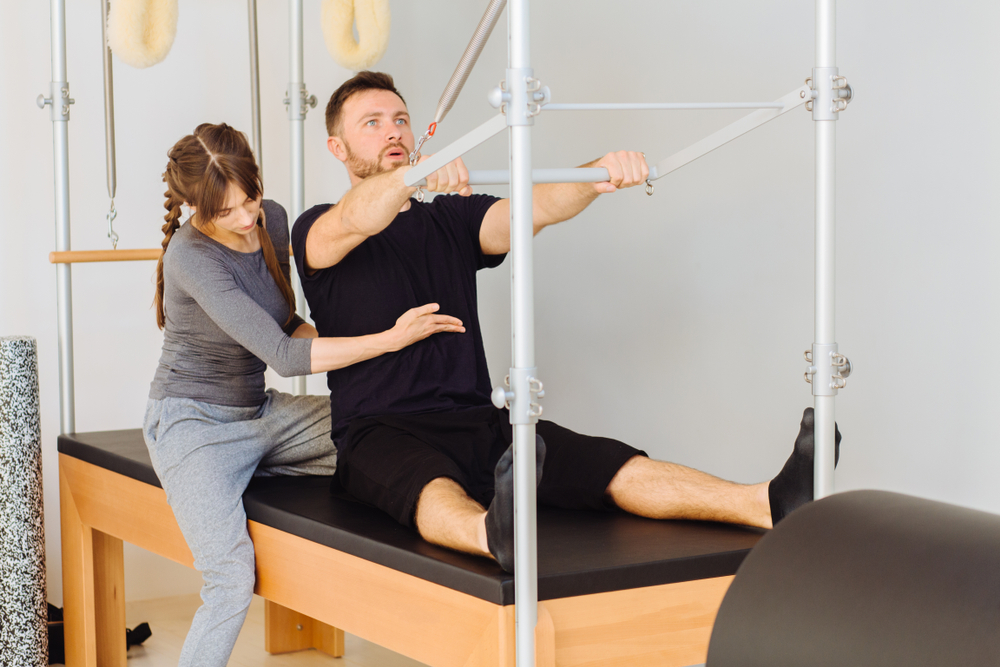
The Benefits Of Clinical Pilates For Mental Health: How Exercise Can Improve Your Mood And Reduce Stress
A fulfilling life requires good mental health to be maintained. Exercise is a frequently-overlooked strategy that can be equally effective in treating symptoms, despite the fact that many people choose it over medication or therapy. Clinical Pilates in particular has been demonstrated to have a favourable effect on mental health, enhancing mood and lowering stress levels. In this blog, we’ll look at the numerous advantages of clinical Pilates for mental health and how it can completely transform your state of health.
Benefits Of Clinical Pilates For Mental Health
Clinical Pilates is a form of exercise that not only benefits physical health but also has positive impacts on mental health. Pilates exercises are designed to work the entire body, strengthening muscles and improving flexibility and balance. However, these exercises also have a calming effect on the mind and can promote relaxation and reduce stress levels. Clinical Pilates is an effective way to improve your mood and overall mental health. Let’s explore some of the ways in which Clinical Pilates can benefit mental health.
- Reduces Stress and Anxiety: Clinical Pilates can reduce stress and anxiety levels by focusing on slow, controlled movements and deep breathing techniques. This helps to calm the mind and release tension in the body, leading to a reduction in stress and anxiety.
- Increases Mind-Body Awareness: Clinical Pilates exercises require a strong mind-body connection. By focusing on the movements and sensations of the body during exercise, individuals can increase their overall awareness and mindfulness. This can lead to an increased ability to manage stress and anxiety.
- Boosts Confidence and Self-Esteem: As individuals become stronger and more flexible through Clinical Pilates, they may experience an increase in confidence and self-esteem. This can have a positive impact on mental health by promoting a more positive self-image and reducing feelings of self-doubt.
- Improves Sleep: Clinical Pilates has been shown to improve sleep quality by reducing stress and anxiety levels and promoting relaxation. Getting enough sleep is essential for good mental health, and Clinical Pilates can help individuals achieve a better night’s sleep.
- Provides a Sense of Community: Clinical Pilates classes provide an opportunity for individuals to connect with others who share similar interests and goals. This sense of community can provide emotional support and reduce feelings of isolation, leading to improved mental health.
Incorporating Clinical Pilates into your fitness routine can have numerous benefits for both physical and mental health. By reducing stress and anxiety levels, increasing mind-body awareness, boosting confidence and self-esteem, improving sleep quality, and providing a sense of community, Clinical Pilates can have a positive impact on overall mental health.
Clinical Pilates Techniques And Exercises For Mental Health
Clinical Pilates is a form of exercise that is specifically designed to improve your physical and mental health. When it comes to mental health, Clinical Pilates can help you reduce stress, anxiety, and depression. Clinical Pilates instructors use a range of techniques and exercises to help you achieve these benefits.
One of the most important techniques used in Clinical Pilates for mental health is mindfulness. Mindfulness involves paying attention to the present moment, without judgement or distraction. By focusing on your breathing, your body movements, and your thoughts, you can learn to stay present and avoid getting caught up in worries or negative emotions.
Another important technique is visualisation. Visualisation involves using your imagination to create positive mental images. This can help you feel more relaxed and confident, as well as more motivated to achieve your goals. For example, you might visualise yourself completing a challenging Pilates exercise with ease, or achieving a personal best in a sport or fitness activity.
Clinical Pilates exercises that are particularly effective for mental health include those that involve breathing, relaxation, and meditation. These can include exercises such as diaphragmatic breathing, progressive muscle relaxation, and body scans. These exercises are designed to help you reduce tension and stress in your body, as well as calm your mind and improve your focus and concentration.
Overall, Clinical Pilates provides a range of techniques and exercises that can be very beneficial for mental health. By practising mindfulness, visualisation, and relaxation techniques, and by incorporating these techniques into your Pilates exercises, you can improve your mood, reduce stress, and achieve a greater sense of calm and well-being.

Clinical Pilates As Complementary Therapy For Mental Health Conditions
Clinical Pilates has been shown to be a useful complementary therapy for various mental health conditions. When used in conjunction with other therapies, it can help to alleviate symptoms and improve overall well-being.
One example is anxiety disorders. Anxiety can manifest in various physical symptoms, such as tension in the muscles and difficulty breathing. Clinical Pilates exercises that focus on controlled breathing, core stability, and relaxation can help to reduce tension in the body and promote a sense of calm.
Depression is another mental health condition that can be addressed with clinical Pilates. It has been shown to improve mood by increasing the levels of endorphins, the body’s natural feel-good chemicals. Pilates also promotes better sleep and helps to reduce feelings of fatigue and lethargy.
For individuals with post-traumatic stress disorder (PTSD), clinical Pilates can be a safe and effective complementary therapy. It can help to reduce muscle tension, anxiety, and promote relaxation. Additionally, Pilates can help individuals to regain a sense of control over their bodies and reduce feelings of dissociation.
It’s important to note that while clinical Pilates can be beneficial as a complementary therapy, it should not be used as a sole treatment for mental health conditions. It’s crucial to seek the guidance of a healthcare professional to develop a comprehensive treatment plan.
Getting Started With Clinical Pilates For Mental Health
Getting started with Clinical Pilates for mental health is similar to starting any new exercise routine, but it is important to approach it mindfully and with a clear understanding of your goals. Here are some steps to consider when beginning Clinical Pilates for mental health:
- Consult with your healthcare provider: It is always a good idea to speak with your healthcare provider before starting any new exercise routine, especially if you have any pre-existing health conditions.
- Find a qualified Clinical Pilates instructor: Look for a certified Clinical Pilates instructor who has experience working with individuals with mental health concerns.
- Start slowly and progress gradually: Clinical Pilates exercises can be challenging, so it is important to start slowly and gradually increase the intensity and duration of your workouts as you feel comfortable.
- Focus on breathing: Breathing is a key component of Clinical Pilates, and it can be a useful tool for managing stress and anxiety. Your instructor will likely guide you through specific breathing techniques during your sessions.
- Be patient and kind to yourself: Remember that it takes time and consistency to see the benefits of Clinical Pilates for mental health. Be patient with yourself and try to approach your practice with a sense of curiosity and openness.
By incorporating Clinical Pilates into your mental health routine, you can improve your overall well-being and reduce symptoms of stress, anxiety, and depression.
Final Thoughts
Clinical Pilates can be an effective complementary therapy for mental health conditions, improving both physical and mental wellbeing. The controlled movements and focus on breath can promote relaxation, reduce stress and anxiety, and improve mood. If you are interested in exploring clinical Pilates for mental health, consider seeking out a qualified instructor who can work with you to develop a personalised program.
At Upwell Health Collective, we offer clinical Pilates sessions with experienced instructors who can guide you towards improved physical and mental health. Don’t hesitate to reach out to us to learn more about how we can support your wellness journey.
Please get in touch with us at Upwell Health at (03) 8849 9096 or book an appointment today.
